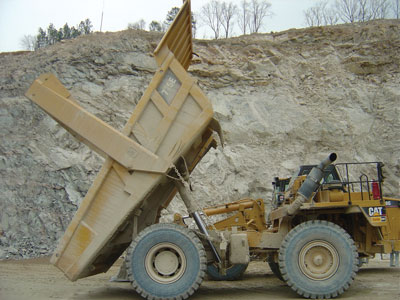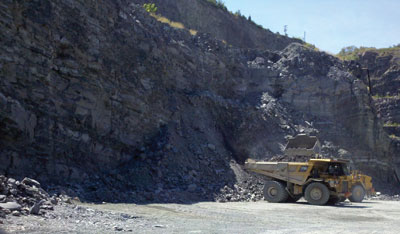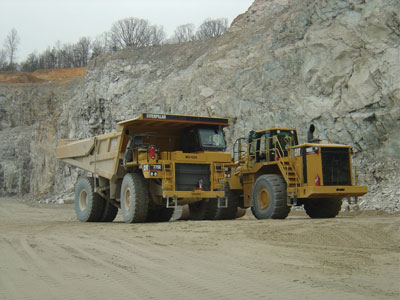
Features
Columns
Education
Tailgate Party
This company has more than luck on its side as it finds the key to success is in the details.
October 17, 2011 By Lindsay Babb
Don’t sweat the small stuff. Don’t fret over the details. Words to live by?
Don’t sweat the small stuff. Don’t fret over the details. Words to live by? Perhaps in one’s personal life such “wisdom” is well advised and embraced. But when it comes to business, the perspectives change drastically. Often, what differentiates a good company from a great company is the attention paid to the so-called “small stuff.” As companies strive to set themselves apart, it’s the little things that can significantly impact the path to success. No one knows that better than Luck Stone.
 |
|
| The tailgates have allowed Luck Stone to haul up to eight more loads and increase revenue by nearly $8,000 in a single day.
|
Luck Stone is third-generation crushed stone, sand and gravel company based in Richmond, Va. With 88 years of experience under its belt and a business encompassing four divisions and 18 quarry sites throughout Virginia and North Carolina, it’s clear by its success that Luck Stone has been doing something right. Consistently, Luck Stone is ranked in the top two aggregate producers in the state of Virginia and it’s the largest family-owned and family-run aggregates company in the United States, employing about 750 associates, 475 of whom work in the aggregates division. Key to its sustained success – sweating the small stuff.
While some aggregate companies remain content to see trucks of material moving from the muck pile to the primary crusher, Luck Stone is looking for more. More productivity. More uptime. More life out of its equipment. It’s that quest for more that led the company to a 20-plus-year working relationship with Philippi-Hagenbuch. It was in the early 1980s when the company purchased its first Philippi-Hagenbuch Heavy Duty Autogate Tailgate, and this seemingly small step has led to big rewards.
Initial Impact
The most evident initial impact of this small addition to the Luck Stone truck fleet was in the way of equipment maintenance and protection. “We have a passion for our equipment,” Butch Rakes, Luck’s mobile equipment manager, says. “We’re very committed to taking care of it in the best possible way we can to ensure it’s up and running so we can take care of our customers.”
With more than 35 years in the mobile equipment industry, Rakes has seen firsthand the importance of proper equipment care and maintenance. He concedes that most companies recognize the value of regular maintenance but sometimes, for a number of different reasons, fail to implement the programs and don’t proactively look for solutions to maintenance concerns.
“We’re constantly looking for ways to protect our equipment investment,” he adds. “We feel it’s the best way we can uphold our vision of providing exceptional service to our customers. Investing in our equipment is the best thing we can do, not only for our company, but for our customers as well.”
It’s that proactive approach to maintenance and protecting the equipment investment that first led the Luck Stone team to Philippi-Hagenbuch. In the day-to-day operation of its aggregate business, the company noticed that material rolling off the trucks had become a huge maintenance, safety and efficiency issue. Rolling debris had the potential to damage another piece of equipment, or worse yet, fall on an operator, and a debris-cluttered road is hazardous for all equipment travelling on that path. If other trucks or loaders were to run over the stones, significant damage could be caused to undercarriages, suspensions and especially the tires. And with the cost of tires steadily increasing to as much as $20,000 or more each, depending on the specific style and size, replacement costs became a major maintenance headache. It was clear something had to be done.
“Before tailgates, we were often forced to stop the equipment and clean the roads on a frequent basis,” explains Jim Van Ness, vice-president of Luck Stone Operational Support. “But that approach significantly hampered our efficiency.”
For example, occasionally in the case of larger stones, the crew would have to bring in a separate loader to move spillage that had fallen off the back of the truck body.
The PHIL gates offered the ideal solution, notes Rakes. “The tailgates protect our equipment investment by safeguarding the tires and the suspensions, and they help us achieve maximum productivity.”
Improved Safety
Not only did the addition of the Philippi-Hagenbuch Heavy Duty Autogate Tailgates reduce maintenance costs, but it also increased overall jobsite safety. The tailgates eliminated the debris roll-off, in turn eliminating the need to have the crew cleaning the haul roads on the mine site.
 |
|
| Luck Stone has found an ideal balance with PHIL’s tailgates – filled to capacity, no more, no less.
|
“Before we purchased the gates, we noticed a serious threat to our workers’ safety,” Rakes continues. “We had guys jumping in and out of haul trucks and pickups to move heavy rocks out of the haul roads. It was time for a better system.”
In addition to eliminating the need to move rock off the haul roads, the tailgates offer the loader operator a better loading target and eliminate the need to reposition rocks in the body to keep them from falling off the back.
Van Ness recalls the loading process as less than desirable. “Before we implemented the tailgates, the loading process felt slow because the loader operator was focusing on loading the front portion of the truck bed. In extreme cases it would be necessary to stop during loading for the operator to reposition the rock in the truck’s bed in order to even the load,” he says. “Rock spillage and the difficulty loading the trucks had been a recurring problem. And what I really remember noticing was how it was adversely affecting the cycle times on our loaders. The process simply was not meeting efficiency expectations.”
Results
As for the result of adding the PHIL tailgates?
“I could see the difference with the tailgates right away,” Van Ness says. “Spillage was reduced and the cycle times on our loaders definitely increased. And of course, it was great to see our guys were no longer clearing debris out on those busy haul roads.
 |
|
| One of Luck Stone’s 18 quarry sites where the PHIL tailgates are used.
|
“We initially chose Philippi’s Standard Autogate Tailgate models for our CAT rigid frame haul units. Those trucks have a 70-ton payload capacity,” he continues. “We’ve continued to use the tailgates ever since.”
Van Ness notes that another benefit of utilizing the tailgates was the ability to achieve the rated capacity of the trucks. But, he’s quick to point out they don’t ever use the tailgates as a means to overload the truck. “If the truck is a 70-ton unit, we don’t use the tailgate to try to get 80-ton on,” he says, adding, “That causes stress on the equipment and one of our core values centres around taking care of the equipment.”
Rakes agrees. “Central to our mission of getting the longevity out of the equipment and having the best equipment we can is treating it properly. Equipment is only designed for a certain tonnage so overloading our trucks is not something we endorse.”
On the other hand, Van Ness agrees that they likely weren’t achieving the rated capacity of the trucks before installing the tailgates, noting the fear of material roll-off as the key reason. “Without the tailgates, some of our trucks weren’t being filled to capacity,” he says. “But they are now!”
Though Luck Stone has been in business long enough to have the experience to rely on intuition rather than mathematical equations to prove the impact on its business, other companies need not look very far to see the big impact of this one small step. With tire prices averaging between $10,000 and $15,000 and up per tire, and tire replacements due to rock damage often occurring one to two times per year, it’s easy to see that this small step quickly saves some big change.
But beyond the maintenance savings is the increased productivity achieved with the tailgates. Faster cycle times can easily increase material delivery by one to two truckloads per hour, serving two purposes – greater profits and happier customers. The majority of Luck Stone’s customers are ready-mix concrete and asphalt producers working in heavy civil and large site construction projects often through state bids. The Luck team works closely with customers to establish pricing and material guarantees to help customers achieve success. Increased productivity ensures the Luck Stone team can maintain its promise of delivering the critical materials customers need, when they need them.
For the Luck Stone team, meeting and exceeding customer expectations is an efficient measurement of success – without the need for additional numbers. However, other similar businesses can also calculate their increased profitability with some quick and simple math. With an average truckload of aggregate valued anywhere from $6 to $14 dollars per ton – depending on region – eight more loads per day on a 70-ton truck results in $3,360 to $7,840 more dollars of revenue each day.
Gut Feeling
For Luck Stone and Van Ness, however, success is less about facts and more tied to a feeling. “I’m not one to exclusively measure productivity with formulas and number crunching. My measurement tactics are based on my experience and what I actually see happening out on the jobsite. And what I was seeing was greater productivity and efficiency. Simple as that.”
 |
|
| Luck Stone originally chose the Standard Autogate Tailgate models.
|
Rakes agrees with Van Ness, stating his experience working on equipment is how he determines improvement on the jobsite.
“The way I measure results? My gut,” he jokes. “Seriously, we track our equipment maintenance cost as well as our component life with our maintenance management system. With this information along with my team’s experience in this industry, we can tell when something is working.” He goes on to state that there were noticeably far fewer maintenance issues due to rock spillage and that equipment life cycles were much longer.
It has been more than two decades since Luck Stone first partnered with PHIL, and just as it did with the first purchase, Luck Stone has continued to utilize Philippi-Hagenbuch’s Heavy Duty Autogate Tailgates.
Though the increased safety, reduced maintenance and improved efficiency offered by this one small step is what led Luck Stone to Philippi-Hagenbuch, it’s something much larger that has kept the company there. Van Ness credits PHIL’s commitment to customer service and a like-minded partnership philosophy as a major reason they’ve remained partners throughout the years.
“They approach customers the way we do – as partners,” says Rakes. “They’re not focused on just making a sale and moving on. They’re here to help solve problems.”
Rakes cites one specific example that made a lasting impression on him and convinced him this vendor shares his company’s philosophy.
“A few years back, we had purchased four [PHIL] tailgates for new CAT 775E haul units we were planning to buy.” However, changes in purchasing decisions led the company to instead buy the newer CAT style, the 775F, which left the four Philippi-Hagenbuch tailgates without a home. They sat idle for quite some time, until one day when Rakes decided to give his sales contact a call and see if there was a solution – and there was. Rather than recommend Rakes try to sell off those tailgates and purchase new ones to accommodate the new equipment, PHIL representatives came out to Luck’s jobsite and helped Rakes and his crew retrofit the existing tailgates to be compatible with the new trucks.
“I was blown away,” Rakes recalls. “They could have easily made a quick buck by trying to sell us brand new units for our new equipment. But they took the time to come out and help us find a solution, and one that would ensure we were getting the best utilization we possibly could.”
This is another example of where one small detail can make all the difference for a customer, a company and a lasting partnership.
Sweating the details may not be advisable in day-to-day relationships or life, but in the world of business one might say the devil is in the details and the company that recognizes that truth is bound for success. Though Luck may be a part of this aggregate company’s name, it’s clear that sound business decisions and a commitment to customers – not luck – play the major role in the company’s outstanding success.
Lindsay Babb is public relations director with Ironclad Marketing in Fargo, N.D. She produced this article for Aggregates & Roadbuilding.
Print this page